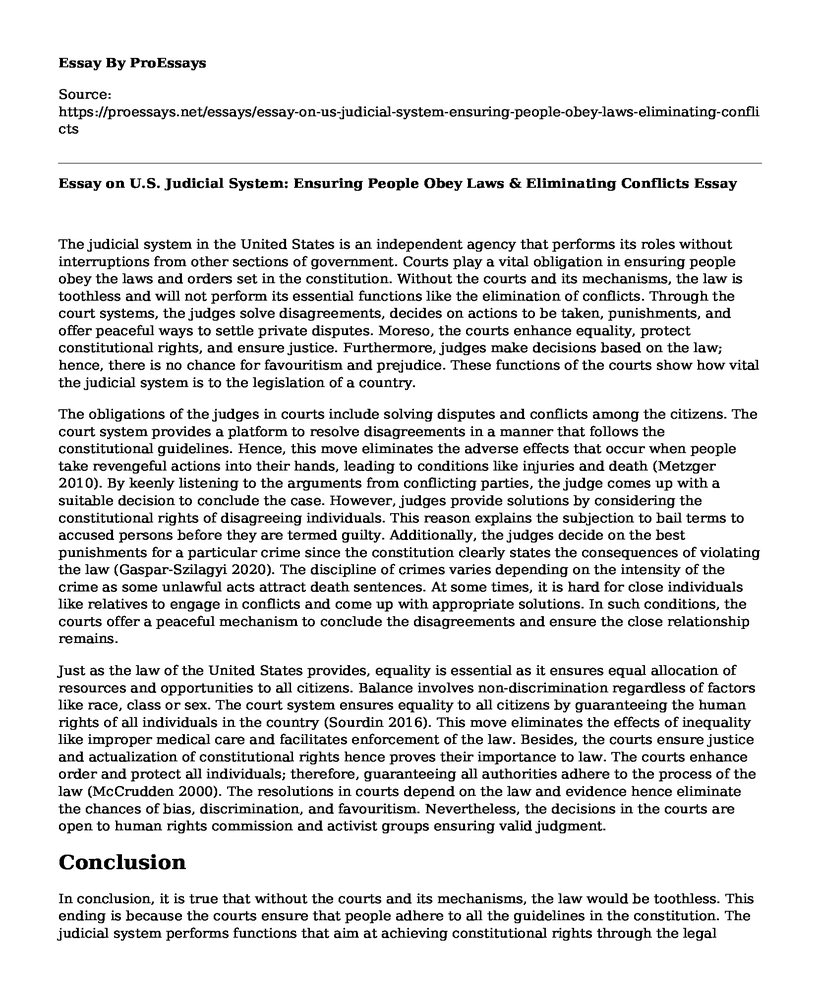The judicial system in the United States is an independent agency that performs its roles without interruptions from other sections of government. Courts play a vital obligation in ensuring people obey the laws and orders set in the constitution. Without the courts and its mechanisms, the law is toothless and will not perform its essential functions like the elimination of conflicts. Through the court systems, the judges solve disagreements, decides on actions to be taken, punishments, and offer peaceful ways to settle private disputes. Moreso, the courts enhance equality, protect constitutional rights, and ensure justice. Furthermore, judges make decisions based on the law; hence, there is no chance for favouritism and prejudice. These functions of the courts show how vital the judicial system is to the legislation of a country.
The obligations of the judges in courts include solving disputes and conflicts among the citizens. The court system provides a platform to resolve disagreements in a manner that follows the constitutional guidelines. Hence, this move eliminates the adverse effects that occur when people take revengeful actions into their hands, leading to conditions like injuries and death (Metzger 2010). By keenly listening to the arguments from conflicting parties, the judge comes up with a suitable decision to conclude the case. However, judges provide solutions by considering the constitutional rights of disagreeing individuals. This reason explains the subjection to bail terms to accused persons before they are termed guilty. Additionally, the judges decide on the best punishments for a particular crime since the constitution clearly states the consequences of violating the law (Gaspar-Szilagyi 2020). The discipline of crimes varies depending on the intensity of the crime as some unlawful acts attract death sentences. At some times, it is hard for close individuals like relatives to engage in conflicts and come up with appropriate solutions. In such conditions, the courts offer a peaceful mechanism to conclude the disagreements and ensure the close relationship remains.
Just as the law of the United States provides, equality is essential as it ensures equal allocation of resources and opportunities to all citizens. Balance involves non-discrimination regardless of factors like race, class or sex. The court system ensures equality to all citizens by guaranteeing the human rights of all individuals in the country (Sourdin 2016). This move eliminates the effects of inequality like improper medical care and facilitates enforcement of the law. Besides, the courts ensure justice and actualization of constitutional rights hence proves their importance to law. The courts enhance order and protect all individuals; therefore, guaranteeing all authorities adhere to the process of the law (McCrudden 2000). The resolutions in courts depend on the law and evidence hence eliminate the chances of bias, discrimination, and favouritism. Nevertheless, the decisions in the courts are open to human rights commission and activist groups ensuring valid judgment.
Conclusion
In conclusion, it is true that without the courts and its mechanisms, the law would be toothless. This ending is because the courts ensure that people adhere to all the guidelines in the constitution. The judicial system performs functions that aim at achieving constitutional rights through the legal process. If the court system is ineffective, the law will not serve its purpose accordingly. This factor explains why the judicial arm of government is independent to allow proper operations in the courts without interference.
References
Gaspar-Szilagyi, S. (2020). Let us not forget about the role of domestic courts in settling investor-state disputes. The law & practice of international courts and tribunals, 18(3), 389-415. https://doi.org/10.1163/15718034-12341410
Metzger, G. E. (2010). Ordinary administrative law as constitutional common law. Columbia law review, 479-536. https://www.jstor.org/stable/27806624
McCrudden, C. (2000). Common law of human rights?: Transnational judicial conversations on constitutional rights. Oxford journal of legal studies, 20(4), 499-532. https://academic.oup.com/ojls/article-abstract/20/4/499/1595147
Sourdin, T. (2016). The Role of the courts in the new justice system. SSRN electronic journal. https://doi.org/10.2139/ssrn.2713576
Cite this page
Essay on U.S. Judicial System: Ensuring People Obey Laws & Eliminating Conflicts. (2023, Jun 06). Retrieved from https://proessays.net/essays/essay-on-us-judicial-system-ensuring-people-obey-laws-eliminating-conflicts
If you are the original author of this essay and no longer wish to have it published on the ProEssays website, please click below to request its removal:
- Analysis of Cases
- Minorities in Policing Essay Example
- In Search of Hard Evidence for the International Criminal Court's Significant Contributions to International Law
- Scarcity of Resources in Healthcare Paper Example
- Texas Judicial Election Essay Example
- Research Paper on Universities in China: Leveraging Information, Innovation and E-Learning
- Dr. King's Assassination: A Rift Widening Between White & Black Americans - Research Paper







